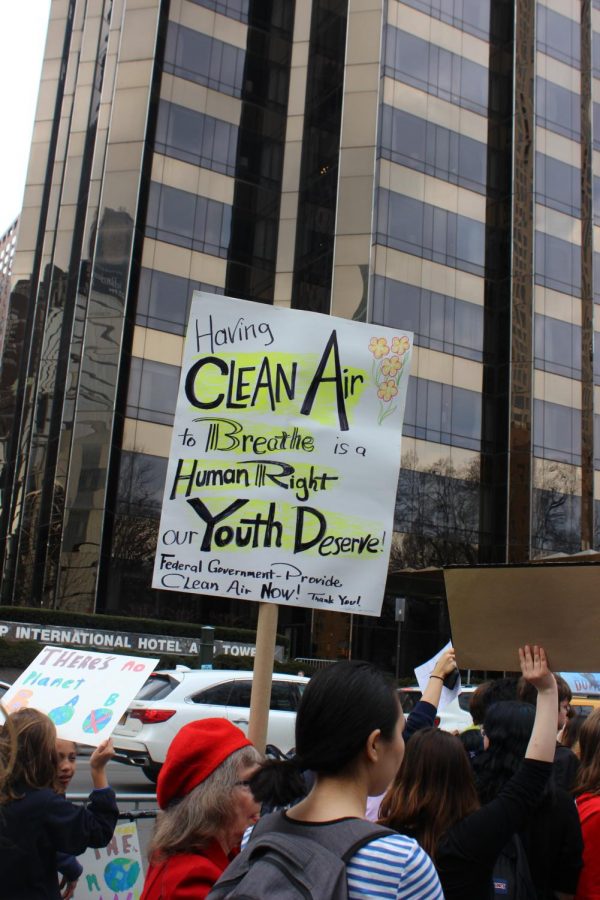Earth Day Celebrations Highlight Environmental Activism At Fordham
SHAMYA ZINDANI/THE OBSERVER
On March 15, students and activists organized a Strike Against Climate Change in Columbus Circle
April 22, 2019
Since 1970, Earth Day has been celebrated on April 22 to raise awareness about environmental issues and take action to improve sustainability.
The sustainability committee at Fordham believes that the Jesuit perspective recognizes the value of minimizing its environmental impact. “Sustainability is one of our number one concerns and Fordham takes it very seriously,” said Gerardo Galiano, assistant director of facilities operations.
Leslie Timoney, associate director of campus operations, has been overseeing the sustainability committee at Fordham for the past seven years. The committee, which is comprised of students and administrators across both Fordham campuses, has worked to ensure that the University is doing everything it can to reduce its carbon footprint.
Fordham is currently participating in New York City’s Water Challenge to Universities, which encourages New York college campuses to cut their water consumption by 5%. Water meters on campus have enabled the committee to interpret data on water use and began initiatives with students to start conserving more water.
Another recent project was Recyclemania, which lasted throughout the month of March. The campaign, which acted as a competition between universities, aimed to raise awareness about waste reduction and increase recycling efforts on college campuses.
“Recycling is the biggest thing that people at Lincoln Center can do,” said Timoney. She noted that both blue cans for recycling and grey cans for trash are supplied in each McMahon apartment and in the trash rooms.
While the Office of Residential Life does require all students on campus to have a recycling bin, Timoney believes that “behavioral change is a student to student initiative.”
On March 15, students and activists organized a Strike Against Climate Change in Columbus Circle, Fordham College Lincoln Center ’20 and outreach director for the environmental club, says that’s where the club steps in. “We’re more focused on student behavior,” she said. “We want to make this campus as sustainable and environmentally-friendly as possible.”
Davidson believes part of the problem is that “people do not know how to recycle … students are not educated, and are not educating themselves. That’s what we are trying to do: educate the campus.”
The Environmental Club is working with Residential Life to include learning about recycling and composting in Residential Assistants (RA) and Residential Freshman Mentor (RFM) training. The club is planning on speaking to incoming freshmen about recycling and composting on campus at orientation this year.
In 2017, the Environmental Club petitioned for and successfully instituted compost bins for food scraps in McMahon. Although the bins do not collect much in relation to the amount of food waste produced, Timoney confirmed that the waste is taken to a private haller where it is delivered to organic farms.
An upcoming project for the club is the implementation of a Reusable Bag Program, which will see communal bags available to students in McKeon and McMahon. “Anyone can take one and go out to the grocery store,” Davidson said. “We hope it reminds people to try and not use plastic bags.”
To encourage environmentally friendly behavior, the Environmental Club arranged a Save Ohno competition between Rose Hill and Lincoln Center in 2018. Save Ohno is an online platform where participants post pictures of themselves doing environmentally friendly activities, such as taking public transport or eating a vegan meal, to earn points.
Modernizing equipment and machinery on campus has also been a way for Fordham to cut down on its carbon footprint in the past seven years. Timoney explained that by replacing washing machines, elevators and air conditioners with modern and more efficient options is where the biggest changes are made in Fordham’s overall pollution.
“Anything new that we put on campus, part of the change is to reduce carbon footprint,” Galiano explained.
In 2016, Fordham updated all its lighting across campus to LED, which, according to energy companies, are 80% more efficient than their fluorescent predecessors. Timoney said that “they last longer and use less energy.”
The committee is looking into making changes like this across the campus. Galiano said that they are currently exploring ice plants which would reduce the environmental cost of air conditioning.
“We want to track and understand our energy consumption,” Gilano said. “That is one of our biggest priorities right now.”
One way the University plans to do this is by implementing a building management system that would track cooling and heating efforts. “We would be able to set deadbands on how cold and how hot we want each room to be which would help us be much more efficient,” Gilano said.
Another focus of both the Environmental Club and the committee is the use of green space on campus. Together, they put planters into the student garden behind McMahon at the end of the Fall 2018 semester.
“A lot of our work this year has been planning and prepping for the garden,” Davidson said.
Since Fordham students are mainly away during the summer, when most plants need to be harvested, the Environmental Club “had to figure out what we can feasibly plant that we can harvest at a time that is most profitable to the Fordham community,” Davidson explained.
Both students and faculty members embody the spirit and activism of Earth Day; through these initiatives they work to limit Fordham’s carbon footprint and make the Fordham community as environmentally friendly as possible.











